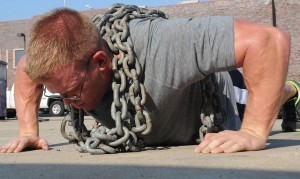Tullian Tchividjian's Blog, page 14
August 21, 2013
Is The Law Gracious?
 Mike Horton asks and then answers the important question: Is the law itself gracious? There’s lots of confusion out there regarding the unique job descriptions of both God’s Law and God’s Gospel. Both are good. Both come from God. But both do very different things.
Mike Horton asks and then answers the important question: Is the law itself gracious? There’s lots of confusion out there regarding the unique job descriptions of both God’s Law and God’s Gospel. Both are good. Both come from God. But both do very different things.
Read this. A genuine recovery of the Gospel depends on us getting these “job descriptions” right:
Is the law itself gracious? Though subtle, there is a world of difference between saying, on one hand, that the Law-giver is gracious and uses the law for gracious purposes and saying, on the other, that the law itself is gracious. Our parents may have been gracious in giving us a curfew, but at least in my home the curfew was not gracious. It was “be home at 10—no ifs, ands, or buts.”
In order for the law itself to be gracious, it would have to offer promises to sinners apart from their personal performance. In other words, it would have to give relief to those who stand in a condition of violating it. This the law manifestly does not and cannot do. The law tells us God’s demands; it simply does not have anything to give as far as assistance and leniency. The law does not budge or bend. If God relaxed his moral law at a single point, he would himself be unlawful; he would violate his own character, which his law manifests.
The law isn’t intrinsically judgmental; it’s simply just. It “calls ‘em as it sees ‘em.” We’re the unjust ones, whom God must size up as such simply because of who he is. The law is God’s revelation of his unchanging moral character and will. The law is not gracious even in a covenant of grace, but it is also not ungracious. It is simply not the character of the law to extend mercy, because that is not its job description. The law can only stipulate what obedience is, issuing approval or disapproval. It stops and goes no further. The God who speaks his law is gracious to his people in revealing his moral will, but only his word of promise in Christ delivers God’s grace and mercy.
Read the rest here.
August 19, 2013
How Much Does Your Life Weigh?
 Life requires many things from us—a successful career, a stable marriage, well-behaved and emotionally adjusted children, a certain quality of life. When life gets hard, the hardworking work harder. Is it any wonder we’re all so weary? We do our best to do better, do more, and do now. The cultural pressure to take care of yourself and “make it happen” by working harder and smarter wears us out. We live with long lists of things to accomplish, people to please, and situations to manage. Anyone living inside the guilt, anxiety, stress, strain, and uncertainty of daily life knows from instinct, and hard experience, that the weight of life is heavy. We are all in need of some relief.
Life requires many things from us—a successful career, a stable marriage, well-behaved and emotionally adjusted children, a certain quality of life. When life gets hard, the hardworking work harder. Is it any wonder we’re all so weary? We do our best to do better, do more, and do now. The cultural pressure to take care of yourself and “make it happen” by working harder and smarter wears us out. We live with long lists of things to accomplish, people to please, and situations to manage. Anyone living inside the guilt, anxiety, stress, strain, and uncertainty of daily life knows from instinct, and hard experience, that the weight of life is heavy. We are all in need of some relief.
Believe it or not, the reason we’re so tired isn’t simply because our children are difficult or that life is busy or that the demands at work keep piling up. The reason we’re so tired is that we’re trying to save ourselves. Let me explain.
Read the rest here.
August 16, 2013
Exploring One Way Love
Join me, Matt Chandler, Steve Brown, Scotty Smith, Elyse Fitzpatrick, David Zahl, Paul Tripp, Andy Crouch, J.D. Greear, Justin Holcomb, Jim Belcher, Paul Zahl, Dan Seidell, and Sally Lloyd-Jones on February 20-23, 2014 at Coral Ridge Presbyterian Church in Fort Lauderdale as we explore God’s One-Way Love in the Christian life, personal failure, families, the church, pop-culture, and more.
Find out everything you need to know here.
LIBERATE 2014 from Coral Ridge | LIBERATE on Vimeo.
August 12, 2013
The Good News Of Final Judgment
 One of the most common questions that come my way is how the concept of “heavenly rewards” fits into a proper understanding of justification by grace alone. Over at Liberate, my friend (and theologian-in-residence) Jono Linebaugh offers a robust theological framework for how to understand this apparent conundrum:
One of the most common questions that come my way is how the concept of “heavenly rewards” fits into a proper understanding of justification by grace alone. Over at Liberate, my friend (and theologian-in-residence) Jono Linebaugh offers a robust theological framework for how to understand this apparent conundrum:
The champions of justification by grace through faith, from Paul to the Protestant reformers, have always confessed that Christ “will come again to judge the living and the dead.” For many, however, this double affirmation of justification by grace and judgment according to works raises an honest question: If Jesus is the basis for our justification, how can our works play a role in our judgment? If, as 1 Corinthians 1:30 puts it, “Christ is our righteousness,” how can anything we do receive a reward? The history of trying to answer questions like these is a tale of much spilled ink (and blood). According to Dane Ortlund’s helpful taxonomy, there are at least fourteen different ways that scholars have attempted to coordinate justification by grace and judgment according to works. The extent of this discussion and debate means that this short reflection cannot pretend to offer a definitive analysis. Instead, what this post hopes to provide is an outline of how to explore this question by considering the relationship between justification and final judgment under three headings: 1) The comfort of Christ’s coming, 2) Jesus as the basis for God’s justifying judgment, and 3) Christ’s righteousness and our rewards.
Read the rest here.
August 9, 2013
There Are Only Two Kinds Of Sermons
Guest Post by Chuck Collins.
Chuck is the founding pastor of Holy Trinity, a new Anglican church plant in San Antonio (2010). Formerly he was rector of Christ Episcopal Church (San Antonio), the largest church in that diocese with 3,000+ members. He is the author of Cramner’s Church: An Introduction to Anglicanism in America. He and his wife, Ellen, have four grown children, three sons-in-law, and one grandson.
——————————————————————————————————————————————————————————
 I marvel when someone says, “I have no regrets.” That’s not me; I have plenty. Perhaps my biggest regret, outside of not spending more time with my kids when they were growing up and not discovering Irish whiskey sooner, is that for much of my 30 years of ordained ministry I have not preached “the gospel.” By-and-large I have been a nice man standing in front of nice people, telling them that God calls them to be nicer. And just about none of it was life-changing.
I marvel when someone says, “I have no regrets.” That’s not me; I have plenty. Perhaps my biggest regret, outside of not spending more time with my kids when they were growing up and not discovering Irish whiskey sooner, is that for much of my 30 years of ordained ministry I have not preached “the gospel.” By-and-large I have been a nice man standing in front of nice people, telling them that God calls them to be nicer. And just about none of it was life-changing.
I have come to see that there are really just two ways to preach: one is the gospel, the other is get-better messages. The first is based on God’s goodness; the second on self-improvement. Gospel preaching presupposes that, even though we deserve punishment for our sins, Jesus Christ suffered the punishment in our place on the cross. Get-better sermons, on the other hand, is moralistic advice in which a preacher mounts a pulpit to scold the people for not doing more or getting better (F Allison).
For more years than I care to think I preached get-better messages. I cringe thinking about my old sermons. I regret the lost opportunities of those messages that pounded home the idea that we just need to be better, try harder, pray and give more, read the Bible every day, attend church every week, and be nicer. It was plain ole Phariseeism, works-righteousness under the guise of preaching – “an easy-listening version of salvation by self-help” (M Horton). Those who came were vaguely entertained, I think, because I am a fairly entertaining personality (so they tell me on their way out of church), but they left mostly feeling beat up and like they don’t measure up. Instead of relieving guilt, get-better sermons reinforced guilt and our inadequacies. They didn’t touch people where they need most. “Whenever you feel comforted or elated or absolved as ‘fresh as a foal in new mowed hay,’ then you know you are hearing the gospel” (P Zahl).
My conversion to gospel preaching was gradual. I don’t remember what the initial catalyst was, except that people weren’t getting better with sermons on discipline and how to improve your marriage. Those moralistic sermons doled out plenty of advice about what to do, but it totally missed what God has done for us in his Son. Christ came, not to help religious people get better, but to help sinners realize that forgiveness and salvation is outside themselves: in Jesus Christ.
St. Paul, in Romans, explains the gospel as God’s power and God’s righteousness (1:16, 17). This is exactly opposite of repairing your nature by a determined will. It is what God has done for us when we couldn’t do it ourselves. He fulfilled the law. He took upon himself our sins. He burst the bonds of death to give us new life. When this message of one-way love – God’s love without strings attached – love when we are not lovely – reaches our hearts, it causes our spirits to come alive to God and it fills us with meaning and purpose. The gospel speaks to our heart’s deepest need.
When you get to church to find out that the preacher is in the third of a 10-sermon series on “10 steps to cure depression” get up and run out of there as fast as your depressed legs can take you. It’s self-help, not the gospel. Chalk it up to a well meaning preacher who hasn’t yet realized that our real hope is in God, in the sufficiency of his work on the cross and in the salvation that is not found in get-better sermons.
August 6, 2013
Forgiven People Forgive
 By now you’ve probably heard of Riley Cooper. Until last week, Cooper’s was a name known only to die-hard Philadelphia Eagles fans; now it’s a household word. Last week, a video surfaced of a drunk Cooper (who is white) using a racial slur (the racial slur) while claiming he wanted to fight all of the African-Americans at a Kenny Chesney concert.
By now you’ve probably heard of Riley Cooper. Until last week, Cooper’s was a name known only to die-hard Philadelphia Eagles fans; now it’s a household word. Last week, a video surfaced of a drunk Cooper (who is white) using a racial slur (the racial slur) while claiming he wanted to fight all of the African-Americans at a Kenny Chesney concert.
In a statement following the video’s appearance on the internet, Cooper said, “I am so ashamed and disgusted with myself. I want to apologize. I have been offensive. I have apologized to my coach, to [Eagles owner] Jeffrey Lurie, to [General Manager] Howie Roseman and to my teammates. I owe an apology to the fans and to this community. I am so ashamed, but there are no excuses. What I did was wrong and I will accept the consequences.”
To most observers, Cooper seems sincere and legitimately contrite. Only God knows, of course. But it’s not the quality of Cooper’s apology that interests me, it’s the reaction of Cooper’s teammates to the apology.
Read the rest here.
August 4, 2013
The Insanity Of Luther
I love this classic lecture by R.C. Sproul on Martin Luther.
It is often thought that the Reformation was launched as a result of Luther’s recovery of the Gospel–justification by grace alone through faith alone in the finished work of Christ alone. However, to be more precise, the Reformation was unofficially launched as a result of the robust seriousness with which Luther took God’s Law.
It was because Luther truly heard God’s unbendable word of demand (Law) that he was able to then hear God’s unflinching word of deliverance (Gospel). As Sproul points out, it’s only when we see that the way of God’s law is absolutely inflexible that we see that the way of God’s grace is absolutely indispensable.
Enjoy…
August 1, 2013
LIBERATE 2014
 Whoever said life is a two-way street was on to something. Reward and punishment, this for that, reciprocity—whatever you want to call it—defines more than just our economy. Our relationships, our careers, our institutions also run on the principle of “I’ll do X for you, if you do Y for me.” Everything in our world demands two-way love. Everything’s conditional. If you love me, only then will I love you. If you give to me, only then will I give to you. If you serve me, only then will I serve you. This conditionality plagues us at every turn and keeps us enslaved to fear, reservation, and insecurity. The talk of owing and deserving seems to be written into the fabric of human nature and civilization. It’s how our world works.
Whoever said life is a two-way street was on to something. Reward and punishment, this for that, reciprocity—whatever you want to call it—defines more than just our economy. Our relationships, our careers, our institutions also run on the principle of “I’ll do X for you, if you do Y for me.” Everything in our world demands two-way love. Everything’s conditional. If you love me, only then will I love you. If you give to me, only then will I give to you. If you serve me, only then will I serve you. This conditionality plagues us at every turn and keeps us enslaved to fear, reservation, and insecurity. The talk of owing and deserving seems to be written into the fabric of human nature and civilization. It’s how our world works.
Thankfully, grace isn’t from our world. It’s otherworldly. God’s love is different from our love. Our love is two-way—it’s conditional. God’s love is one way—it’s unconditional. And it’s this kind of love that can alone change our hearts and set us free.
Join me, Matt Chandler, Steve Brown, Scotty Smith, Elyse Fitzpatrick, David Zahl, Paul Tripp, Andy Crouch, J.D. Greear, Justin Holcomb, and Sally Lloyd-Jones on February 20-23, 2014 at Coral Ridge Presbyterian Church in Fort Lauderdale as we explore God’s One-Way Love in the Christian life, personal failure, families, the church, pop-culture, and more. Our prayer is that Liberate 2014 will be a resting place for you, your family, your friends, your pastors, and your church leaders.
Registration opens today. Find out everything you need to know here.
July 30, 2013
Peter And The Promise
 Apart from his being the first to acknowledge that Jesus was the Christ, the son of God, almost everything Peter did in the Gospels ended in a correction, a rebuke, or just simple failure. It is hard to imagine how to be a worse disciple than Peter, short of rejecting the faith entirely, once and for all. He could be relied upon to fail at doing God’s bidding, with one or two salient exceptions. Yet these exceptions were enough for Jesus to proclaim that he was the rock. Why?
Apart from his being the first to acknowledge that Jesus was the Christ, the son of God, almost everything Peter did in the Gospels ended in a correction, a rebuke, or just simple failure. It is hard to imagine how to be a worse disciple than Peter, short of rejecting the faith entirely, once and for all. He could be relied upon to fail at doing God’s bidding, with one or two salient exceptions. Yet these exceptions were enough for Jesus to proclaim that he was the rock. Why?
Read the rest here.
July 24, 2013
A Tale Of Two Lunches
 Below is an excerpt from my forthcoming book One Way Love: Inexhaustible Grace for an Exhausted World (David C. Cook, October 2013)
Below is an excerpt from my forthcoming book One Way Love: Inexhaustible Grace for an Exhausted World (David C. Cook, October 2013)
I was sixteen when my parents kicked me out of the house. What started out as run-of-the-mill adolescent rebellion in my early teens had, over the course of a few short years, blossomed into a black hole of disrespect and self-centeredness that was consuming the entire family. I would lie when I didn’t have to, push every envelope, pick fights with my siblings, carry on, and sneak around—at first in innocent ways; later in not-so-innocent ways. If someone said “black,” I would say “white.” Nothing all that terrible by the world’s standards, but given my Christian context and upbringing, it was pretty egregious. Eventually, everyone involved reached the end of their patience, and looking back, I can’t blame them. It’s not as though my parents hadn’t tried every other option. Private school, public school, homeschool, counseling, interventions—you name it.
Anything they did just made me want to rebel more. Eventually, my lifestyle became so disruptive, the fights so brutal, that my parents were forced to say, “We love you, son, but if you’re going to continue living this way, you can’t do so under our roof.”
My parents were well loved in our community, and their friends could see the heartache they were going through with me. I remember two separate instances of people caring enough to ask them for permission to talk with me one-on-one to see if maybe they could get through to me.
The first time was early on, when I was still living at home. Their friend picked me up after school, brought me to Burger King, and read me the riot act. “Look at all that God’s given you. You’re squandering everything. You’re making your parents’ life a living hell, acting so selfishly, not considering your siblings. You go to a private school. You have this remarkable heritage. Shape up, man! Snap out of it.” Of course, he was 100 percent right. In fact, if he had known the full truth of what I was up to (and what was in my heart), he would have had every reason to be even harsher. But in the first five minutes of this guy talking to me, I could tell where it was going, and I just tuned out. As far as I was concerned, it was white noise. I could not wait for it to be over and for him to drop me back off at home.
This first friend was the voice of the law. He was articulating the standard that I was falling short of—what I should have been doing and who I should have been being—and he couldn’t have been more correct. The condemnation was entirely justified. His words gave an accurate description of who I was at that moment. But that’s the curious thing about the law and judgment in general: it can tell us who we are, it can tell us the right thing to do, but it cannot inspire us to do that thing or be that person. In fact, it often creates the opposite reaction than the one that is intended. It certainly did for me! I don’t blame the man in question—he was trying to do the right thing. It’s just that his methods completely backfired.
The second experience happened about a year and a half later, and by this time I was out of the house. This man called me and said, “I’d love to meet with you.” And I thought, Oh no, another one of my parents’ friends trying to set me straight. But I didn’t want to make things any worse between my parents and me, and the free meal didn’t sound too bad either, so I agreed to get together with him.
Once we were at the restaurant, he just looked at me and said, “Listen, I know you’re going through a tough time, and I know life must seem very confusing right now. And I just want to tell you that I love you, I’m here for you, and I think God’s going to do great things with you. Here’s my phone number. If you ever need anything, call me. If you want to tell me something you don’t feel comfortable telling anybody else, call me. I just want you to know that I’m here for you.” And then he switched the subject and started talking about sports. That guy—the second guy—is still a friend of mine to this day. He will forever be marked in my personal history as an example of amazing grace.
Most parents and spouses, siblings and friends—even preachers—fall prey to the illusion that real change happens when we lay down the law, exercise control, demand good performance, or offer “constructive” criticism. We wonder why our husbands grow increasingly withdrawn over the years, why our children don’t call as much as we would like them to, why our colleagues don’t confide in us, why our congregants become relationally and emotionally detached from us.
In more cases than not, it happens because we are feeding their deep fear of judgment—by playing the judge. Our lips may be moving, but the voice they hear is that of the law. The law may have the power to instruct and expose, but it does not have the power to inspire or create. That job is reserved for grace–grace alone.
In Romans 7, the Apostle Paul makes it clear that the law illuminates sin but is powerless to eliminate sin. That’s not part of its job description. It points to righteousness but can’t produce it. It shows us what godliness is, but it cannot make us godly. The law can inform us of our sin but it cannot transform the sinner. Only the gospel can do that. As Martin Luther said, “Sin is not canceled by lawful living, for no person is able to live up to the Law. Nothing can take away sin except the grace of God.”
The law may expose bad behavior, but only grace can woo the heart.
Tullian Tchividjian's Blog
- Tullian Tchividjian's profile
- 142 followers



